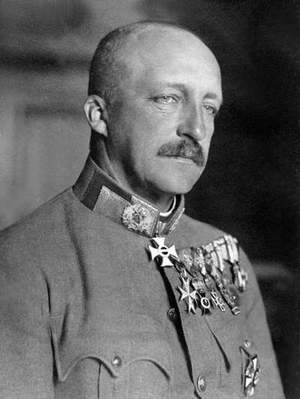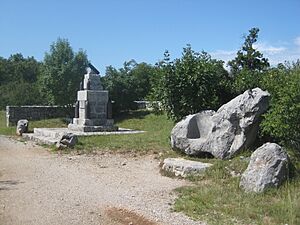Archduke Joseph August of Austria facts for kids
Quick facts for kids Archduke Joseph August |
|||||
|---|---|---|---|---|---|
| Palatine of Hungary (titular) | |||||
 |
|||||
| Regent of Hungary | |||||
| In office 7 August 1919 – 23 August 1919 |
|||||
| Monarch | Vacant | ||||
| Prime Minister | István Friedrich | ||||
| Predecessor | Gyula Peidl (as acting head of state) |
||||
| Successor | István Friedrich (as acting head of state) |
||||
| Born | 9 August 1872 Alcsút, Kingdom of Hungary |
||||
| Died | 6 July 1962 (aged 89) Rain, Bavaria, West Germany |
||||
| Spouse | Princess Auguste of Bavaria | ||||
| Issue Detail |
|
||||
|
|||||
| House | Habsburg-Lorraine | ||||
| Father | Archduke Joseph Karl, Palatine of Hungary | ||||
| Mother | Princess Clotilde of Saxe-Coburg and Gotha | ||||
Archduke Joseph August Viktor Klemens Maria of Austria (born August 9, 1872 – died July 6, 1962) was an important military leader. He became a Feldmarschall, which is the highest rank in the army. He served in the Austro-Hungarian Army. For a short time, he was also the head of state of Hungary.
He was a member of the House of Habsburg-Lorraine, a very old and powerful royal family. His father was Archduke Joseph Karl of Austria. His grandfather was Palatine Joseph of Hungary, who was like a viceroy or governor of Hungary.
A very famous jewel, the Archduke Joseph Diamond, is named after him. This diamond is huge, weighing 76.02 carats, and is perfectly clear. It was officially recorded as his property.
Contents
Growing Up and Family Life
Joseph August was born in a place called Alcsút in Hungary. When he was 21, in 1893, he married Princess Auguste Maria of Bavaria. Her mother, Archduchess Gisela, was the daughter of Emperor Francis Joseph I of Austria. This meant Joseph August became the Emperor's grandson-in-law.
Joseph August and Princess Auguste had six children:
- Archduke Joseph Francis of Austria, born in 1895.
- Archduchess Gisela Auguste Anna Maria, born in 1897.
- Archduchess Sophie Klementine Elisabeth Klothilde Maria, born in 1899.
- Archduke Ladislaus Luitpold, born in 1901.
- Archduke Matthias Joseph Albrecht Anton Ignatius, born in 1904.
- Archduchess Magdalena Maria Raineria, born in 1909.
Military Career
Joseph August started his military journey in 1890 as a young officer called a Leutnant. He quickly moved up the ranks. By 1904, he was in charge of a Hussar regiment, which was a type of cavalry unit. Later, he commanded larger groups of soldiers, including an infantry division in Budapest by 1911.
World War I Service
When World War I began in 1914, Joseph August was sent to fight in Galicia. He led the VII Corps and fought bravely in the Carpathian Mountains. For his actions, he received important awards like the Austrian Order of Leopold and the Prussian Iron Cross.
Later, when Italy joined the war, he was moved to the Italian front. He fought in many battles along the Isonzo River. He was very popular with his soldiers, especially those from Hungary.
In 1916, Joseph August was given command of a large army group fighting against Russian and Romanian forces. He continued to earn high honors, including the Military Order of Maria Theresa and the Pour le Mérite. In 1918, he took command of the 6th Army and later the South Tyrolean Army Group.
On October 24, 1918, he was promoted to Feldmarschall (Field Marshal). He was the last person to receive this top rank in the Austro-Hungarian Army. This promotion was an attempt by Emperor Charles I to keep Hungarian people happy.
Life After the War
After World War I, things changed a lot in Hungary. On October 27, 1918, Emperor Charles made Joseph August the "Homo Regius" of Hungary. This meant he was the Emperor's representative. However, Joseph August soon wanted to be free from his promise to the Emperor.
He tried to form a new government, but a big uprising called the Aster Revolution happened on October 31, 1918. This stopped his plans. Hungary then became a republic.
However, Joseph August remained popular. On August 7, 1919, he became the head of state of Hungary again, acting as a regent. He appointed István Friedrich as Prime Minister. But other countries did not want a member of the Habsburg family to lead Hungary. So, Joseph August had to resign on August 23, 1919.
In 1920, Joseph August became the first knight of the Hungarian Order of Vitéz. He also became a member of the Hungarian Parliament's upper house. From 1936 to 1944, he was the president of the Hungarian Academy of Sciences.
During World War II, he fled Hungary in 1944 and went to the United States. He later returned to West Germany. He passed away in 1962 at Rain, near Straubing.
Family Legacy
Joseph August's eldest son, Archduke Joseph Francis of Austria, died before him in 1957.
His main heir was his grandson, Archduke Joseph Árpád of Austria (1933–2017). Joseph Árpád had children, including Archduke Joseph Karl, who was born in 1960.
His granddaughter Archduchess Ilona of Austria (1927–2011) married George Alexander, Duke of Mecklenburg. Their son, George Borwin, Duke of Mecklenburg, is now the head of the House of Mecklenburg-Strelitz.
Honours
Archduke Joseph August received many awards and honors throughout his life. These included:
- From Austria-Hungary: The Order of the Golden Fleece, the Order of the Iron Crown, the Imperial Order of Leopold, and the Military Order of Maria Theresa. He also received the Military Merit Cross and the Royal Hungarian Order of St. Stephen.
- From Germany: The Iron Cross (both 2nd and 1st Class) and the prestigious Pour le Mérite (military award). He also received awards from the Kingdom of Bavaria, a part of Germany.
- From other countries: The Order of Leopold from Belgium, the Order of St. Alexander from Bulgaria, and the Order of Charles III from Spain. He was also an honorary member of the Royal Victorian Order from the United Kingdom.
See also
 In Spanish: José Augusto de Austria para niños
In Spanish: José Augusto de Austria para niños
 | John T. Biggers |
 | Thomas Blackshear |
 | Mark Bradford |
 | Beverly Buchanan |


